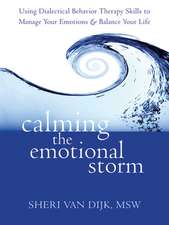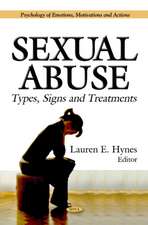Feeling Power: Emotions and Education
Autor Megan Boleren Limba Engleză Paperback – 24 feb 1999
| Toate formatele și edițiile | Preț | Express |
|---|---|---|
| Paperback (1) | 401.70 lei 6-8 săpt. | |
| Taylor & Francis – 24 feb 1999 | 401.70 lei 6-8 săpt. | |
| Hardback (1) | 1279.75 lei 6-8 săpt. | |
| Taylor & Francis – 23 feb 1999 | 1279.75 lei 6-8 săpt. |
Preț: 401.70 lei
Nou
Puncte Express: 603
Preț estimativ în valută:
76.89€ • 83.55$ • 64.63£
76.89€ • 83.55$ • 64.63£
Carte tipărită la comandă
Livrare economică 19 aprilie-03 mai
Preluare comenzi: 021 569.72.76
Specificații
ISBN-13: 9780415921046
ISBN-10: 041592104X
Pagini: 268
Dimensiuni: 152 x 229 x 20 mm
Greutate: 0.43 kg
Ediția:New.
Editura: Taylor & Francis
Colecția Routledge
Locul publicării:Oxford, United Kingdom
ISBN-10: 041592104X
Pagini: 268
Dimensiuni: 152 x 229 x 20 mm
Greutate: 0.43 kg
Ediția:New.
Editura: Taylor & Francis
Colecția Routledge
Locul publicării:Oxford, United Kingdom
Notă biografică
Virginia Polytechnic University, and has published widely in the areas of cultural studies, feminist studies and philosophy.
Recenzii
"Feeling Power is a bold and provocative book whose breadth of inquiry is stunning...Boler takes the reader on a wide-ranging interdisciplinary exploration... This book is both exciting and useful. It is a helpful resource for those of us who keep looking for better pedagogies to address ethical dilemmas in our college and university classrooms. And it is a wonderful book for anyone fascinated by the politics of emotions and by their role in ethical reasoning." -- Hypatia, Barbara Houston
"This book makes a fundamental contribution to feminist theory. Feeling Power gives rare insight into the politics of emotion in education. Boler is passionate about centering emotion in our understanding of intelligence and social action." -- Donna Haraway, author of Modest Witness@Second Millenium.FemaleMan Meets OncoMouse: Feminism and Technoscience
"This book argues for the need to situate the often isolated and isolating work we do in education in a historical and political framework - one that accounts for class, economic, and power relationships that we both identify with and are identified within. . . Boler ruptures the 'absent presence' of emotions in our professional lives; that is, she dares to move emotion away from the terrain of the unspeakable and into the territory of the spoken, considered, and hence 'knowable.'. . .Feeling Power is a text that promises discomfort, and might very well move us from complacency to action, from slumber to consciousness. . . For its power to unsettle the commonplaces of thought, for its power to cause us to recognize discomfort as a starting point of critique, we should all commend the author of Feeling Power" --Jennifer Driscoll (Univ. of Wisconsin - Milwaukee) for JAC, Vol. 20.3 (2000)."
"Feeling Power is a groundbreaking work that strikes a mortal blow against the separation of reason and emotion that has defined our thinking about the role emotions play in our lives. Boler's impressive and historically-informed study provides powerful new directions for thinking about emotions in relation to social control, education, and resistance." -- Sandra Lee Bartky, author of Femininity and Domination: Studies in the Phenomenology of Oppression
"Feeling Power is a wide-ranging, thought provoking and stimulating analysis of an important and little-examined nexus: the place of emotion in cognition, power and pedagogy." -- Ruth Frankenberg, author of White Women, Race Matters: The Social Construction of Whiteness
"This book makes a fundamental contribution to feminist theory. Feeling Power gives rare insight into the politics of emotion in education. Boler is passionate about centering emotion in our understanding of intelligence and social action." -- Donna Haraway, author of Modest Witness@Second Millenium.FemaleMan Meets OncoMouse: Feminism and Technoscience
"This book argues for the need to situate the often isolated and isolating work we do in education in a historical and political framework - one that accounts for class, economic, and power relationships that we both identify with and are identified within. . . Boler ruptures the 'absent presence' of emotions in our professional lives; that is, she dares to move emotion away from the terrain of the unspeakable and into the territory of the spoken, considered, and hence 'knowable.'. . .Feeling Power is a text that promises discomfort, and might very well move us from complacency to action, from slumber to consciousness. . . For its power to unsettle the commonplaces of thought, for its power to cause us to recognize discomfort as a starting point of critique, we should all commend the author of Feeling Power" --Jennifer Driscoll (Univ. of Wisconsin - Milwaukee) for JAC, Vol. 20.3 (2000)."
"Feeling Power is a groundbreaking work that strikes a mortal blow against the separation of reason and emotion that has defined our thinking about the role emotions play in our lives. Boler's impressive and historically-informed study provides powerful new directions for thinking about emotions in relation to social control, education, and resistance." -- Sandra Lee Bartky, author of Femininity and Domination: Studies in the Phenomenology of Oppression
"Feeling Power is a wide-ranging, thought provoking and stimulating analysis of an important and little-examined nexus: the place of emotion in cognition, power and pedagogy." -- Ruth Frankenberg, author of White Women, Race Matters: The Social Construction of Whiteness
Cuprins
Foreword, Preface, Acknowledgments, PART 1: Emotions as a Site of Social Control, CHAPTER ONE. FEELING POWER, CHAPTER TWO. DISCIPLINED EMOTIONS, CHAPTER THREE. CAPITALIZING ON EMOTIONAL “SKILLS”, CHAPTER FOUR. TAMING THE LABILE STUDENT, PART II: Emotions as a Site of Political Resistance, CHAPTER FIVE. A FEMINIST POLITICS OF EMOTION, CHAPTER SIX. LICENSE TO FEEL, CHAPTER SEVEN. THE RISKS OF EMPATHY, CHAPTER EIGHT. A PEDAGOGY OF DISCOMFORT, Bibliography, Author Index, Subject Index














